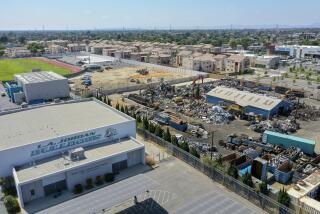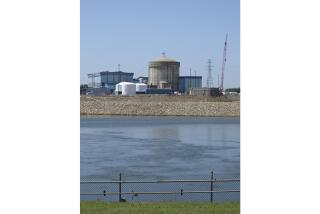U.S. Discloses Accident History at Nuclear Plant
- Share via
WASHINGTON — The Savannah River Plant in South Carolina, a large federal complex that produces fuel for the nation’s nuclear weapons, has experienced numerous reactor accidents that have been kept secret for as long as 31 years, two congressional committees disclosed Friday.
The Department of Energy responded to the disclosure by saying that it had been unaware of the accidents, which occurred at all five of the plant’s nuclear reactors, until inspectors began investigating a power surge at one of them last August.
A 1985 memorandum made public at a hearing by the Senate Governmental Affairs Committee and the House Government Operations subcommittee on environment, energy and natural resources listed 30 incidents at the Savannah River Plant between 1957 and 1985. They included one in which fuel rods melted and another in which a chain reaction nearly went out of control.
30 Incidents
The 1985 memo, written by a plant supervisor to his superiors at Du Pont Co., which operates the plant for the government, reviewed the history of the plant and ranked the 30 “incidents of greatest significance.”
“There are currently some senior managers within the department with an attitude toward production reactor safety which on the face seems to be similar to that which existed in the space program prior to the Challenger accident,” said another memo released at the hearing.
That memo was written Sept. 16 by Richard Starostecki, a deputy assistant secretary, to his boss, Ernest Baynard III, the assistant energy secretary for environment, safety and health.
Dexter Peach of the congressional General Accounting Office told the hearing that there was no danger of the reactor going out of control during the August power surge, “but nobody knew it at the time.” The surge occurred during the restarting of one of the plant’s reactors.
“This could have been another Chernobyl if they had guessed wrong,” said Sen. John Glenn (D-Ohio). “If I didn’t know what was going on in a nuclear reactor, I would shut it down.”
More to Read
Sign up for Essential California
The most important California stories and recommendations in your inbox every morning.
You may occasionally receive promotional content from the Los Angeles Times.










